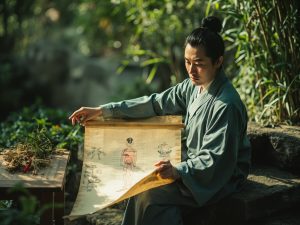Table of Contents
TogglePrinciples of Tongue Diagnosis in Traditional Chinese Medicine – Qi, Blood, and Body Fluids Nourish the Tongue
Author: Gu Yuxi Editor: Gu Yuxi Translator: Gu Yuxi
Principles of Tongue Diagnosis (3): Qi, Blood, and Body Fluids Nourish the Tongue
The tongue is a muscular organ rich in blood vessels, relying on the nourishment of Qi and blood, and the moistening of body fluids.
The form and color of the tongue body are related to the abundance and state of circulation of Qi and blood; the moistness or dryness of the tongue coating and the tongue body is related to the fullness or deficiency of body fluids.
Beneath the tongue, at the frenulum, are the Jinjin and Yuye points. Traditional Chinese Medicine believes that saliva is the fluid of the Kidneys, and thin saliva is the fluid of the Spleen, both being parts of the body fluids. Their generation and distribution are inseparable from the functions of the internal organs, especially closely related to the Kidneys, Spleen, and Stomach. Therefore, by observing the moistness or dryness of the tongue body, one can determine the fullness or deficiency of body fluids in the body, as well as the cold or heat nature of pathogenic factors.
— Excerpt from Li Candong’s Diagnostics of Traditional Chinese Medicine
My Annotations and Analysis:
《Huangdi Neijing·Lingshu·Jingmai》 (Yellow Emperor’s Inner Classic – Miraculous Pivot – Meridians): ‘The Spleen meridian of Foot Taiyin…connects to the root of the tongue and disperses beneath it.’ The Spleen meridian directly connects to the tongue, and the Spleen is the source of Qi and blood production, upon which the tongue body relies for nourishment.
《Suwen·Zhizhen Yaoda Lun》: ‘When the five types of Qi become excessive and constrained, they manifest. Bitterness on the tongue is associated with this.’ The tongue appearance reflects the degree of Qi stagnation and is directly related to the state of Qi and blood circulation.
《Xuanyin Yimi·Jiuchang Ji·Qi Lun》 (Hidden Mysteries – Nine Constants – Treatise on Qi): ‘The tongue is the sprout of the Heart, the bloom of the Blood, and the manifestation of Qi.’
《Suwen·Xuanming Wuqi Pian》 (Simple Questions – Explanation of the Five Types of Qi): ‘The five viscera transform fluids: the Heart transforms into sweat, the Lungs into nasal mucus, the Liver into tears, the Spleen into saliva (thin), and the Kidneys into saliva (thick). These are called the five fluids.’
《Zhenjiu Jia Yi Jing·Juan San》 (Classic of Acupuncture and Moxibustion – Volume 3): ‘Jinjin and Yuye are located in the vessels on either side beneath the tongue, and they primarily treat stiffness of the tongue with difficulty in speaking, and dry mouth.’
《Xuanyin Yimi·Jiuchang Ji·Ye Lun》 (Hidden Mysteries – Nine Constants – Treatise on Fluids): ‘The Kidneys govern the five fluids, their manifestation is in saliva (thick); the Spleen governs saliva (thin), its fullness is manifested in the lips.’
Disclaimer:
The experiences and insights shared above represent the author’s personal usage and understanding, and are provided for reference only as part of academic exchange. Please do not blindly replicate or apply them; any consequences arising from such actions are solely your responsibility. As individual constitutions vary, medication should be tailored accordingly. It is advisable to use such treatments under the guidance of a qualified physician. If you have additional experiences to share, comments and submissions are welcome.
If you appreciate my article, please give it a like.
If you are a generous and affluent individual, please consider making a donation!
Your recognition is my greatest motivation to continue writing—thank you very much!
USD Donation Button —
A RMB donation button is available below.
 微信赞赏
微信赞赏 支付宝赞赏
支付宝赞赏




